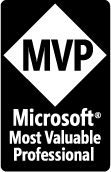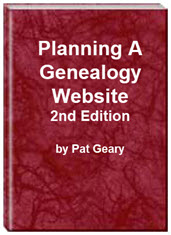- Home
- Resources
- Tutorials
- Tutorials & Articles
- Add Search Box
- Converting a Theme Based Site to DWT
- Converting a Table Based Layout
- Create custom Error Pages
- Create 301 Redirects
- Creating a New Website
- Creating a FrontPage Web
- Create a Gradient Image
- Creating Layered Backgrounds
- Creating A Navigation Menu
- Creating Website Navigation
- Heading Tags - <h1> to <h6> tags
- Server Side Includes
- www versus non www
- Using Bordered Backgrounds
- RootsWeb Banners, Hyperlinks, and CSS
- Fixed Width Layout Templates
- Contact

Top 10 Genealogy Mistakes to Avoid
I’m always telling folks that once you get the “genealogy bug” it is ADDICTIVE. As a hobby, it can be fascinating as well as frustrating but very addictive. Each step you take in researching your family can lead you to new ancestors. Sometimes you may even find stories about your ancestors and sometimes you may find things you might rather not know. If you are new to genealogy research or even if you are an old timer, there are ten key mistakes you might want to avoid to make your search successful.
Kimberly Powell advises:
Don’t Forget Your Living Relatives – YOUR family members are YOUR most important source, and often the only source for the stories which bring our family history to life. Make sure you talk to them BEFORE they are gone.
Don’t Trust Everything You See in Print – In your searching, you may have come across a written genealogy on your family or a family tree on the Internet. Just because it has been written down or published does not necessarily mean that it is correct. Everyone from professional genealogists to your own family members can make mistakes! Transcriptions of various records – censuses, cemetery records, wills, etc can also contain errors. How many times have you seen a census record that was transcribed and then looked at the actual records and found something totally different? The Internet is a valuable genealogy research tool, but Internet data, like other published sources, should be approached with skepticism.It too can contain errors and in some cases is totally wrong.
We’re Related To… Someone Famous – Many people become involved in genealogy research in the first place because they share a surname with someone famous and assume that it means they are somehow related to that renowned individual like John White Geary in my husband’s case. That turned out not to be true. Or Daniel Boone in my father’s family which turns out is true. Just as you would research any other surname, you need to start with yourself and work your way back to the “famous” ancestor.
Genealogy is More Than Just Names & Dates – Rather than being concerned about how far back you’ve traced your family (to the Barons of Runnymede or Charlemagne) or how many names you have in your tree, try and get to know your ancestors. What did they look like? Where did they live? What events in history helped to shape their lives? Your ancestors were real people just like your or I and like us, they had hopes and dreams. One of the best ways to find our some of the stories about your ancestors is to talk to your LIVING relatives. My husband lived to be 102 years old and has written sketches of some of his relatives. He was the oldest living member of his family and now that he is gone, those stories will be lost so get them now while there is still time.
Beware Generic Family Histories – We’ve all seen them or received an email about them – advertisements which promise “a family history of *your surname* in America.” Don’t let yourself be mislead into believing that this could be YOUR family history. Most of these generic family histories usually contain
- a few paragraphs of general information on the origin of the surname (usually one of several possible origins and likely having nothing to do with your family)
- a coats of arms (which were granted to a specific individual, not a specific surname, and therefore, in all likelihood, do not belong to your specific surname or family)
- a list of people with your surname (usually taken from phone books which
are widely available on the Internet)
Save you money!
Don’t Accept Family Legends As Fact – Many, if not all, families have stories and traditions which are handed down from generation to generation. Stories about famous ancestors, war heroes, surname changes, and the family’s nationality all probably have their roots in fact. It is YOUR job to check out these stories and legends and see what is fact and what is fiction. If you cannot prove or disprove these stories, you can still include them BUT make sure you explain what is true and what is not and write down how you arrived at your conclusions. There has always been a rumor in my own family (maternal) that we had Native American ancestry. So far, I have discovered NO PROOF of that, so it remains a rumor.
Don’t Limit Yourself to Just One Spelling – Using my husband’s family as an example, if we had only researched the one spelling GEARY which is how my husband’s family spells his surname, we would have missed PETER GARY, a Revolutionary War soldier and his entire line. Always search for variations on the spelling of your ancestor’s name. In this care GEARY, GARY, GAREY are just a few of the spellings used by the various lines. Be sure to try all alternate name variations as well – including middle names, nicknames, married names and maiden names.
Don’t Neglect to Document Your Sources – Unless you really like having to do your research more than once, it is important to keep track of where you find all of your information. Document and cite your genealogy sources, including the name of the source, its location and the date. It’s also helpful to make a copy of the original document or record or, alternatively, an abstract or transcription. Again, using my husband’s family as an example, I inherited a very large database of individuals descended from Peter Gary, the Revolutionary War soldier. While the original information may have had sources, none of them were entered in the database – not even the name of the individual who had supplied the original information. Over the years, I have gone back and added documentation to the entries so that much of the information is now well documented BUT so much time could have been saved if it had been included originally. It also makes it easier for you to remember what you’ve already done, or go back to a source when you find new evidence which appears to conflict with your conclusions.
Don’t Jump Straight to the Country of Origin – Many folks want to trace their ancestors back to the country of origin BUT before you can do that, you need to do your homework and find out about them in this country. Where are they located? Why did they move? Knowing the country is not enough, you are going to need to know the town or village they came from in order to locate records.
Don’t Misspell the Word Genealogy – You’ll be using the word a lot. Learn to spell it correctly.
You can read the full article Top 10 Genealogy Mistakes to Avoid by Kimberly Powell at ThoughtCo.com. The article also contains links to other interesting article on this fascinating and addicting hobby.
Planning a Genealogy Website 2nd Edition is available as a 42 page EBook in pdf format for you to download. It has been totally revised and updated with new content. The EBook is zipped for faster download. Save it to your desktop, extract the file and it is ready to use.

April 2007 - April 2013
Disclosure: This is an affiliate link, which means that if you visit Bluehost.com through this link and purchase this product, I’ll get a commission.
Microsoft® and FrontPage® and Expression Web® are registered trademarks of Microsoft® Corporation.
Genealogy Computer Tips | Expression Web Tutorials & Templates


